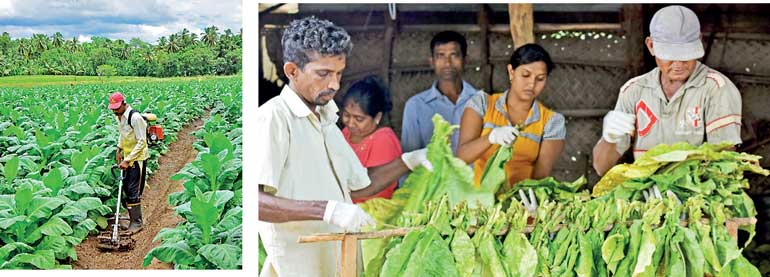Thursday Feb 26, 2026
Thursday Feb 26, 2026
Monday, 25 September 2017 00:00 - - {{hitsCtrl.values.hits}}
 Ceylon Tobacco Company PLC (CTC) has a history of over 100 years of operating in Sri Lanka, during which time it has established itself as a benchmark for corporate excellence and become a vital player in the country’s agriculture and business sectors. The company’s involvement in the agricultural sector in particular, extends over 70 years with leaf growing operations starting as far back as the 1950s.
Ceylon Tobacco Company PLC (CTC) has a history of over 100 years of operating in Sri Lanka, during which time it has established itself as a benchmark for corporate excellence and become a vital player in the country’s agriculture and business sectors. The company’s involvement in the agricultural sector in particular, extends over 70 years with leaf growing operations starting as far back as the 1950s.
Throughout its years in business, CTC has nurtured agricultural best practices through their core business and other sustainability initiatives, enriching the lives of tobacco farmers and uplifting the rural economy, through the infusion of Rs. 1.5 billion annually. The company’s efforts have led to CTC being recognized as a pioneer in the field of agriculture in Sri Lanka.
Since inception, the company has offered tobacco farmer communities support and security through the forward contract system, meaning that the full crop grown by them is purchased by the company at a pre-agreed, competitive price. Unlike with most other cash crops, CTC guarantees a price ranging between Rs. 480-500 per kilo of leaf produced, ensuring that farmersreceive a guaranteed monthly income.
By using 100% locally grown tobacco leaf in its manufacturing process, the company eliminates the outflow of over Rs. 4 billion in foreign currency, which would otherwise be spent on leaf importation. In addition, through its interventions, CTC ensures that cigarette tobacco cultivation is burden free to the state. Tobacco is a cash crop farmers choose to grow during the ‘Yala’ season when there is inadequate water for paddy cultivation. Over 20,000 farmers across the island supply CTC’s leaf requirement using less than 0.01% of the total arable land in the country – anoteworthy feat achieved through continuous guidance on agricultural best practices, such as improving productivity and yield.
Tobacco farmers are provided with free extension services through 34 leaf offices island-wide. When compared to other cash crops, the direct and indirect employment generated through tobacco cultivation is the highest in the country. Consequently, tobacco farmers are considered more creditworthy by financial institutions, giving them greater access to other business opportunities, and the chance to improve the quality of life for themselves, their families and the communities around them.
Another key initiative supported by the company is the pension scheme which benefits tobacco farmers upon retirement, ensuring a livelihood even when they are no longer able to grow tobacco. In addition, the Company also awards scholarships to farmers’ children who qualify to pursue higher studies. CTC further invests in the professional development of leaf farmers with opportunities to attend international training programs.
“At CTC, we have a long and proud history of working directly with tobacco farmers and advancing agricultural practices in the country. We support tobacco farmers by giving them resources worth over Rs. 140 million on credit basis along with free extension services. We also provide them with a multitude of employment opportunities year on year. As such, I strongly believe that our involvement in this industry has had a significant socio-economic impact; upliftingfarmer communities and enriching the rural economy.We will continue to support sustainable farmer livelihoods in the years to come,” Michael Koest, Chief Executive Officer and Managing Director of the Ceylon Tobacco Company stated.
CTC was the first agri-based company in Sri Lanka to introduce Sloping Agriculture Land Technology(SALT) alongside several other benchmark sustainable initiatives and extension services, which have since been adopted by other companies. In 1995, Sri Lanka became the first tobacco cultivating countryin the world to eliminate the use of firewood for tobacco curing by introducing paddy husk fueled curing systems. By 2011, the tobacco curing process had been further enhanced through the introduction of the barn automation technology, an innovation by a local tobacco farmer.
CTC also ensures that tobaccofarming practices are carried out in compliance with Sustainable Tobacco Production (STP) standards, ensuring that environmental impacts are minimised along the leaf supply chain.Contrary to popular belief, a recent study carried out by the University of Peradeniya in the Galewela area has revealed that incorporating tobacco in paddy based crop rotation did not cause soil fertility degradation.
Tobacco farmers it works with are valued business partners, and it is CTC’s priority to make them feel secure and confident about their future, and to be self-sufficient and prosperous. CTC will continue to enrich the socio-economic status of tobacco farmers that it recognises as a valuable component of the Sri Lankan farming community.
Pix by Indraratna Balasuriya